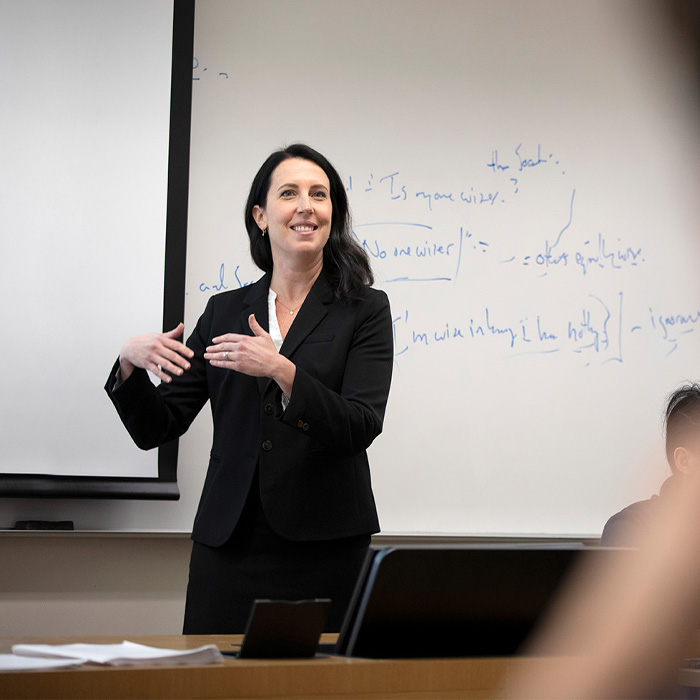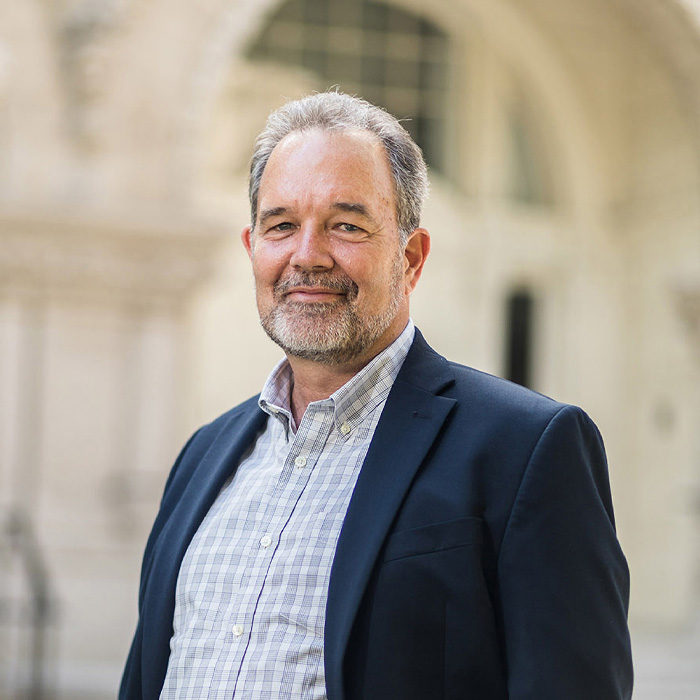
Shanna Rose, Alice Tweed Tuohy Associate Professor of Management and Government
Photo by Anibal Ortiz
The Best Policy
Professor Shanna Rose finds inspiration in the aspirations of students in CMC’s Public Policy major.
Life doesn’t get better than this for Shanna Rose.
As director of CMC’s Public Policy major, she has the privilege of watching students learn, debate, and start their careers in public service. It’s the perfect role for a scholar who always imagined herself teaching at a liberal arts college.
“This literally is my dream job,” said Rose, the Alice Tweed Tuohy Associate Professor of Management and Government.
Every year, more CMC students major in Public Policy, making it one of the College’s three fastest-growing programs. Seventy-five students are enrolled in the major. That’s impressive for a program that began only five years ago.
“It’s really thriving, and that’s gratifying to see,” she said.
Anyone who hears Rose talk about her students immediately knows that teaching was her destiny. Her father was an Economics professor, and her mother was a teacher and art critic. With the value of a liberal arts education in her heart, Rose headed east from her Hawaii home to Swarthmore College for her undergraduate years.
Her big surprise came in the form of a Swarthmore introductory Economics class. “I always had assumed economics was boring,” she remembered with a laugh, alluding to her dad’s career. The course was so fascinating she went on to major in the subject.
Rose moved to Washington, D.C., after graduation to work at the Brookings Institution and Peterson Institute for International Economics, influential think tanks that taught her about public policy. “Take any of the world’s big problems—climate change, poverty, homelessness—public policy is about studying what causes the problem and what we can do about it.
“What could be more important to study than that?”
Inspired by purpose, she earned her doctorate in Political Economy and Government at Harvard University, where she was honored for excellence in teaching. She joined CMC in 2014 as a professor to research American politics, public policy, and the division of power among federal, state and local governments. With two published books about federalism and a third in the works, she relishes writing and scholarship. Yet her passion remains her students and the liberal arts education at CMC, which she calls “a special place.”
The Public Policy major is a natural fit for the College with its mission of preparing students for thoughtful and productive lives and responsible leadership in business, government, and the professions, as well as to support faculty and student scholarship that contributes to intellectual vitality and the understanding of public policy issues.
Public Policy students take core courses in Government and Economics, along with Philosophy, Psychology, and History. Some even take electives in Math, such as “The Mathematics of Gerrymandering.” The flexibility of a liberal arts education enables students to customize the major, said Rose, who is teaching “State and Local Politics and Policy” this semester.
She watches with pride as students discover their unique interests. Urban planning, land use regulations, housing, and homelessness top their lists these days. “These are issues we grapple with in our own backyard,” Rose said.
Polarized politics may be the norm nationally, but she is encouraged by CMC students who focus on problem-solving, and like Rose herself, seek evidence and fruitful dialogue around solutions. “They want to exchange ideas, and they want the best idea to win,” she said. “Even when they come to class with an idea, and they see another person make a good point, they reexamine how they think about an issue.”
“They make it easy to be a professor. I love our students.”
–Alicia di Rado
Exploring Ideas That Last a Lifetime
Philosophy Professor Paul Hurley inspires students beyond their years at CMC.
It’s common for Paul Hurley to check in with his former students.
“They use me sometimes as a sounding board,” said Hurley, CMC’s Edward J. Sexton Professor of Philosophy. “It’s not a relationship that stops when they graduate, they come by to talk through things, and I love that. They want to continue to think through their choices and their priorities deeply and they want your help. I want to be there to do that. This is not just a job to me, it’s a life’s work.”
Hurley joined CMC in 2007, arriving from Pomona College to help build “the best liberal arts college Philosophy department in the country,” he said. “The way to do that is to find those brilliant people who really care about teaching and say, ‘We’ve created a space where you can continue to explore your ideas, and have the space for this deeply meaningful interaction with your students and be pushing the frontiers of knowledge.’”
And for Hurley, this has meant leading by example.
Over his years at CMC, Hurley has served as director of the Philosophy, Politics, and Economics (PPE) Program, and been honored with teaching awards, as well as the Roy P. Crocker Award for Merit.
And, while Hurley clearly loves teaching at CMC, he said he thinks that his effectiveness in the classroom is directly linked to his own research and work as a scholar.
Specializing in ethics, with a concentration on political philosophy, business ethics, and philosophy of law, Hurley earned a prestigious CMC faculty research grant for 2023-24. His articles have been published in numerous journals, while his most recent book, Against the Tyranny of Outcomes, came out in fall of 2024.
In it, Hurley dismantles the tyranny of outcome-centered ethics, and how they distort our understanding of value, reason and action, profoundly impacting our democratic and legal systems.
As an example, Hurley said, “We know that we have really good reasons not to lie to people. Your parents can explain, or you can explain to your children, why lying only works when the truth is expected. By its nature, it’s a betrayal of trust, and it’s inherently manipulative. You’re getting somebody to do something by abusing their trust—something that they would not do if they knew the truth—(in a way) that benefits you, or that you think benefits them, but that bypasses their own chance to make that decision. So, it’s a terrible thing. But, from an outcome-centered perspective, lying is what you ought to do anytime you calculate that it brings about the best outcome.”
These are the types of ideas that Hurley explores in his classroom, and can explain why his students seek him out for counsel beyond their time at CMC.
“The root of philosophy is Philosophia. It means lover of wisdom,” he said. “The worst mistake you can make in life is to live it and realize at the end that what you were doing was harmful or terrible, right? It’s why philosophy has such broad appeal, especially at a school like CMC. These are bright students. Show them that things might be a little more complicated than they assume, and they want to know more.”
–Anne Bergman

Photo Courtesy of Paul Hurley